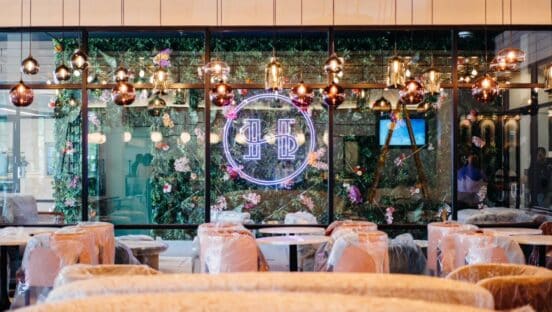Let’s talk deals.
For the third consecutive year, QSR is taking a stab at spotlighting the quick-service industry’s best franchise deals. From dozens of submissions, we’ve narrowed it down to 10 brands, taking into consideration favorable sales-to-investment ratios, unique market niches, positive sales trends, and formidable corporate support.
While this year’s list includes some repeat honorees—Subway, Popeyes, Bojangles’, and Saladworks appear for a second or third time—there’s also plenty of new blood entering the ranks.
Read on to find out which 10 brands distinguish themselves best in a competitive franchise marketplace.
Bojangles’ Famous Chicken ‘n Biscuits
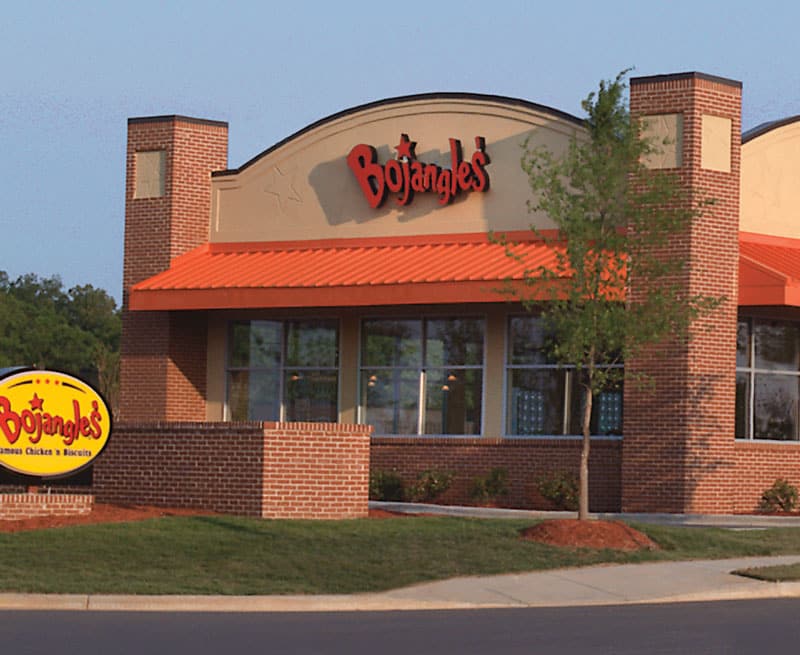 Total U.S. Unit Count: 506 / 310 franchised
Total U.S. Unit Count: 506 / 310 franchised
Franchise Fee: $25,000
Total Start-Up Costs: $357,000–$553,750
Royalty: 4% of gross sales
Renewal Fee: $12,500
Marketing Fee: 1% of gross sales
With AUV of $1.6 million in 2011 and start-up costs maxing out around $550,000, Bojangles’ boasts a virtually unrivaled sales-to-investment ratio near 3:1.
Three full dayparts continue to drive Bojangles’, which saw its systemwide sales inch toward $770 million in 2011 as same-store sales grew for a fifth consecutive year. Breakfast accounts for about 40 percent of business, while the brand’s breaded, never-frozen chicken drives its lunch and dinner business.
Bojangles’ executive vice president of development Eric Newman says the brand’s success is rooted in its food quality and unique positioning. “[Bojangles’] has continued to develop operational processes, systems, new products, support, and store design,” Newman says, adding that the company’s recent successes make it “a better deal today than it was even one year ago.”
An Outside View: David Omholt, CEO of Texas-based Entrepreneur Authority, says Bojangles’ story keeps getting better. “It’s very rare to see ROI like theirs in the [quick-serve] space,” Omholt says, adding that the company’s “obvious bias for quality” has heightened its upward trajectory.
Total U.S. Unit Count: 301 / 105 franchised
Franchise Fee: $30,000
Total Start-Up Costs: $359,600–$448,600
Royalty: 5% of gross sales
Renewal Fee: 25% of then-current franchise fee
Marketing Fee: 1.5% of gross sales
Bruegger’s supports both traditional locations in the 1,500–2,500-square-foot range and scaled-down bakery layouts ideal for airports or office buildings. Franchisees also benefit from regional operations consultants who provide ongoing support, as well as a dedicated marketing team that builds local awareness. These factors helped push 2011’s AUV near $725,000 and spark a sales-to-investment ratio that approaches 2:1.
Since the menu features boiled, hearth-baked bagels, along with salads, soups, and sandwiches, Bruegger’s vice president of franchise development Chris Cheek says, sales are almost evenly distributed between breakfast and lunch. Though Bruegger’s does not have dinner hours, most franchisees relish the normal working hours that bring a quality of life rare in the restaurant industry.
An Outside View: Omholt says Bruegger’s healthy culture and “solid” unit economics propel systemwide success. Its appearance on Franchise Business Review’s most recent annual franchisee satisfaction survey, meanwhile, provides empirical evidence that Bruegger’s is as focused on having a compelling product as it is on maintaining productive relationships with franchisees, he says.
[pagebreak]
Total U.S. Unit Count: 218 / 203 franchised
Franchise Fee: $15,000
Total Start-Up Costs: $63,000–$395,000
Royalty: 5% of net sales
Renewal Fee: $10,000
Marketing Fee: 4% of net sales
Dallas-based Dickey’s, which had its AUV surpass the $800,000 mark in 2011, remains among the nation’s fastest-growing barbecue chains.
Richard Phillips, Dickey’s vice president of development, says the family-run, third-generation business offers more than 70 years of proven restaurant expertise and high growth potential courtesy of an extensive training program at Dickey’s Barbecue University. It also features ongoing operations support and an energized marketing program that supports franchisee profitability, he says.
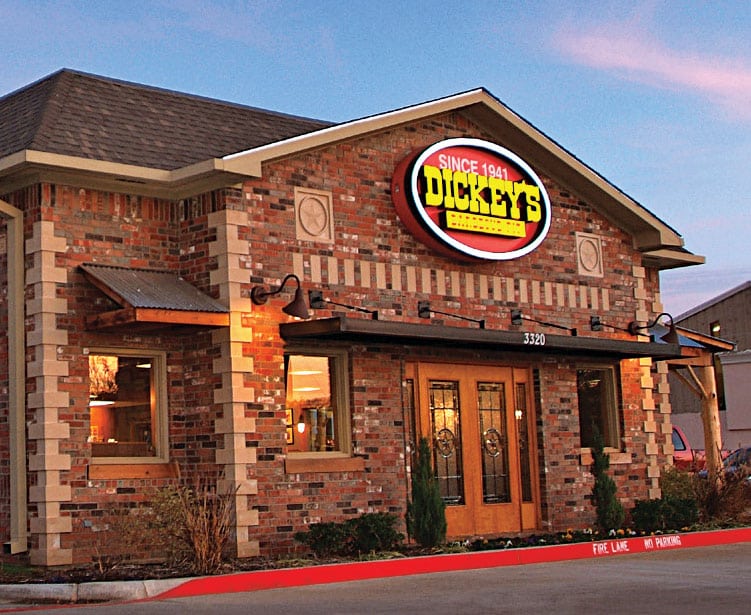 Phillips adds that the fast-casual barbecue brand offers myriad real estate options, ranging from traditional free-standing restaurants to shopping-center end caps and nontraditional units, including airports, theme parks, and convenience stores. Such flexibility allows prospective franchisees an opportunity to capitalize on favorable commercial real estate costs present throughout many U.S. markets.
Phillips adds that the fast-casual barbecue brand offers myriad real estate options, ranging from traditional free-standing restaurants to shopping-center end caps and nontraditional units, including airports, theme parks, and convenience stores. Such flexibility allows prospective franchisees an opportunity to capitalize on favorable commercial real estate costs present throughout many U.S. markets.
An Outside View: Though the barbecue segment can be challenging with regional competitiveness, Jon Jameson, a former Panera Bread executive who is now a principal with the Bellwether Food Group, calls Dickey’s “the value leader in the chain barbecue category.” He says the concept is positioned to compete with its “good smoked meats and tasty sides at prices that are surprisingly reasonable.”
Freddy’s Frozen Custard & Steakburgers
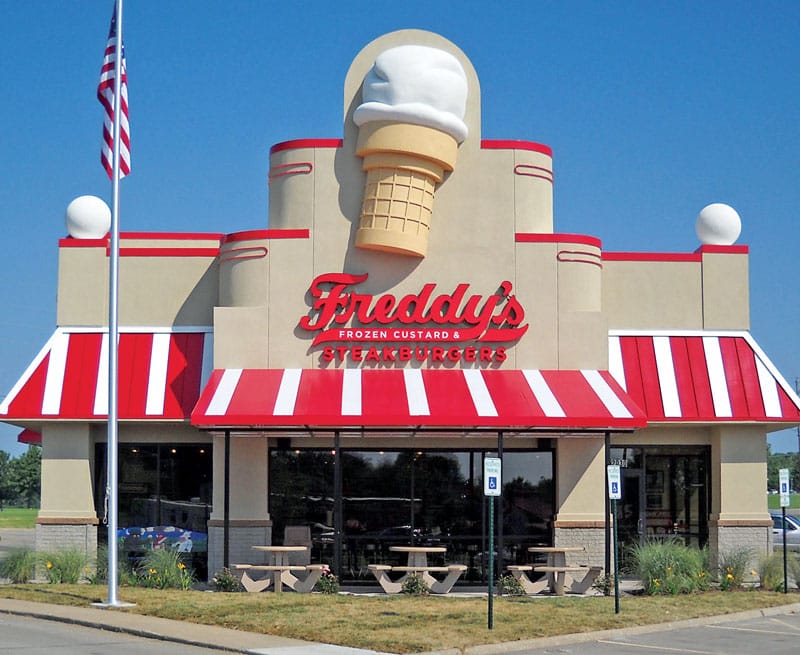 Total U.S. Unit Count: 58 / 49 franchised
Total U.S. Unit Count: 58 / 49 franchised
Franchise Fee: $25,000
Total Start-up Costs: $395,000–$835,000
Royalty: 4.5% of gross sales
Renewal Fee: 1⁄3 of then-current license fee
Marketing Fee: .25% of gross sales
Despite a presence in only 20 states, Wichita, Kansas–based Freddy’s Frozen Custard & Steakburgers is quickly gaining a national following. In 2011, systemwide sales climbed to more than $70 million as AUV topped $1.3 million, largely on the back of Freddy’s cooked-to-order premium steakburgers, Freddy’s Fries, and fresh-made custard.
A formal “Freducation” training program and infrastructure for franchisee coaching help ensure consistency throughout the system, while the corporate office embraces low fees and transparency, highlighted by a longstanding practice of returning all incentives and rebates to franchisees.
“Freddy’s fun and friendly culture is … a direct result of the autonomy granted to entrepreneurs to succeed with a cost-effective means of growth and the ability to build a winning brand while remaining independent,” Freddy’s COO Scott Redler says.
An Outside View: “[Freddy’s] low fees and above-average AUV are no longer a secret, and I think we’ll see them have a true national footprint in the coming years,” Omholt says. He adds that Freddy’s inviting, nostalgic décor and high-quality burgers have allowed the brand to hold its own in head-to-head marketplace battles against the likes of Steak ‘n Shake and In-N-Out Burger.
[pagebreak]
Total U.S. Unit Count: 451 / 435 franchised
Franchise Fee: $30,000
Total Start-Up Costs: $450,615–$768,843
Royalty: 5% of net sales
Renewal Fee: 10% of then-current franchise fee
Marketing Fee: 4% of net sales
In the competitive fast-casual Mexican segment, Moe’s has created a niche with its quirky stores and on-trend practices, including its mobile ordering app, the addition of Coca-Cola Freestyle machines to its locations, and customized dishes featuring eco-friendly ingredients like organic tofu, all-natural chicken, and grass-fed steak.
“Moe’s is mindful of a consumer base that craves more choices faster,” Moe’s vice president of franchise sales Steven Corp says.
In 2012, Moe’s will open more than 50 restaurants, led by expansion into nontraditional spaces such as airports, universities, and malls. Corp says Moe’s ambitious development is driven by conscientious corporate support and sales-driving menu extensions, such as catering, that allowed franchised restaurants open for three or more years to report average total net sales of $1,102,495 in 2011.
An Outside View: Moe’s 2007 acquisition by FOCUS Brands, Jameson says, “brought strong business acumen to a brand that was too focused on brand growth versus brand and franchisee success.” He believes a focus on operational execution, customer service, and thoughtful menu variety allow Moe’s to compete in a crowded segment.
Total U.S. Unit Count: 45 / 38 franchised
Franchise Fee: $40,000
Total Start-Up Costs: $752,000–$1,054,500
Royalty: 5% of net sales
Renewal Fee: None
Marketing Fee: .5% of net sales
Since opening its first location in 2004 in the shadow of the University of Mississippi, this culinary-driven fast casual has built a loyal customer base with a distinctive flavor profile characterized by “made from scratch, made fresh daily” recipes.
In 2011, Newk’s AUV approached $2.4 million, a tally few in the quick-service industry can match. That figure also places Newk’s average sales-to-investment ratio over the 2:1 mark, which vice president of franchise operations Stephen J. Hinkis says spurs interest in Newk’s franchising initiatives.
The Jackson, Mississippi–based brand, which was created by the founders of McAlister’s Deli, plans to open 20 units this year, with an additional 32 units in the development pipeline for 2013. Newk’s corporate team assists in all aspects of the restaurant, including site selection and pre-opening, as well as ongoing support initiatives in purchasing, marketing, and operations.
An Outside View: Omholt says Newk’s “tops anything I’ve seen in quite a while.” He says the combination of high-quality fare and low prices puts Newk’s in a strong position and predicts the chain will have more than 100 units within the next two years.
Next: Popeyes Louisiana Kitchen
[pagebreak]
Total U.S. Unit Count: 2,035 / 1,587 franchised
Franchise Fee: $30,000
Total Start-Up Costs: $306,300–$371,100 for a freestanding unit
Royalty: 5% of gross sales
Renewal Fee: $15,000
Marketing Fee: 4% of gross sales
Celebrating its 40th anniversary, Atlanta-based Popeyes has plans for accelerated growth throughout 2012, both on and off U.S. soil.
Popeyes vice president of development Greg Vojnovic says the company’s strategic plan execution and highly franchised business model generate profitable results for system operators. Those include efficient advertising of relevant, traffic-driving new product innovations; effective tools to support and measure improved speed of service and guest experience; supply chain cost reductions, process improvements, and training that improve profitability; and site-selection tools that have resulted in a pipeline of qualified operators opening new restaurants with AUV above 2011’s system average of $1.1 million.
To further boost its appeal, Popeyes offers numerous current franchisee incentives, including a rapid-year development program for those who open their units within six to nine months of site approval, incentives for opening freestanding units in specific markets, and incentive programs for minorities, women, and military veterans.
An Outside View: Omholt credits the Popeyes franchise management team with cooking up impressive shareholder and franchisee value.
“All of their key metrics from the annual report—revenues, net income, [earnings per share], free cash flow, same-store sales, etc.—demonstrate an impressive trend line,” he says.
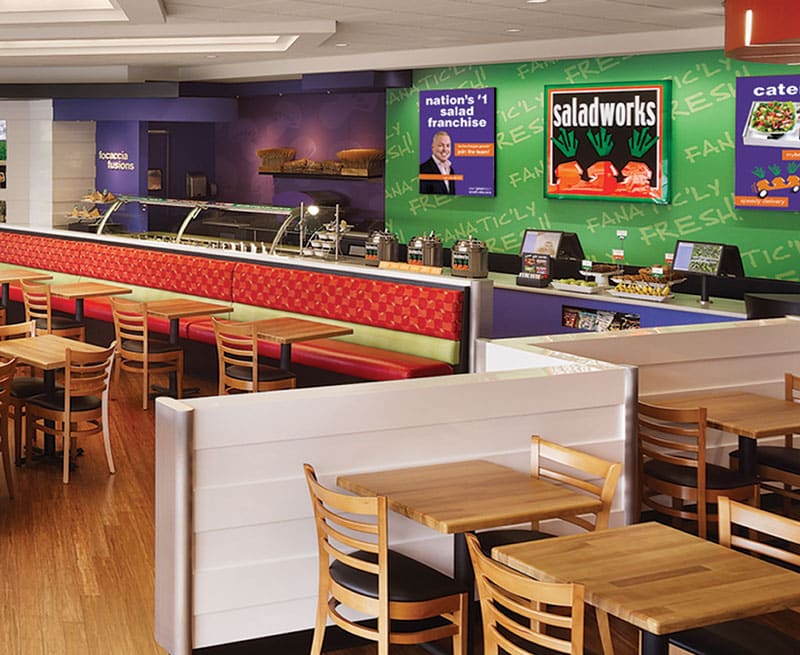 Total U.S. Unit Count: 99 / 96 franchised
Total U.S. Unit Count: 99 / 96 franchised
Franchise Fee: $30,000–$35,000
Total Start-Up Costs: $375,628–$536,594
Royalty: 5% of gross sales
Renewal Fee: $17,500
Marketing Fee: 3% of gross sales
Driven by an on-trend menu that promotes 52 fresh ingredients and salads averaging less than 300 calories, Saladworks continues making headway as an alternative to traditional fast food fare.
With AUV over $1 million, Saladworks boasts a sales-to-investment ratio hovering near 2:1, a tally that continues to attract franchisees to the Pennsylvania-based system.
Saladworks chairman and CEO John Scardapane says the company’s franchise model has proved stable and scalable over 25 years. He points specifically to the fact that more than 70 percent of franchise partners own or have committed to own more than one location.
Scardapane adds that franchisees also benefit from protected search areas and store territories, as well as catering opportunities that produce a supplemental revenue stream. There are also various training and support measures, such as ongoing business consultation, targeted local and regional marketing plans, social media tool boxes, and continual menu development.
An Outside View: Jameson says Saladworks has a formula for success with its healthy, nutritious, and flavorful salads along with fresh soups and sandwiches served quickly in a colorful and fun environment. “Start-up costs are reasonable and sales at a level that can provide a reasonable ROI for franchisees,” he says.
[pagebreak]
Total U.S. Unit Count: 152 / 83 franchised
Franchise Fee: $40,000
Total Start-up Costs: $500,000 approx.
Royalty: 5–6% of net sales
Renewal Fee: None
Marketing Fee: 2% of net sales
In the dynamic better-burger segment, Denver-based Smashburger has earned a cult following for its highly customized, regionally adapted menu and smashed, 100 percent Angus beef burgers.
With systemwide sales approaching $116 million in 2011, Smashburger’s AUV now tops $1 million, a sign of the robust momentum it offers its multiunit franchisees.
Smashburger chairman and CEO Dave Prokupek says his company provides its franchisees a number of distinguishing characteristics, including: six weeks of training at corporate headquarters and at the franchisee’s location; ongoing support in the form of a franchisee newsletter, field evaluations, purchasing cooperatives, and security procedures; and marketing support from co-op advertising and national and regional spots.
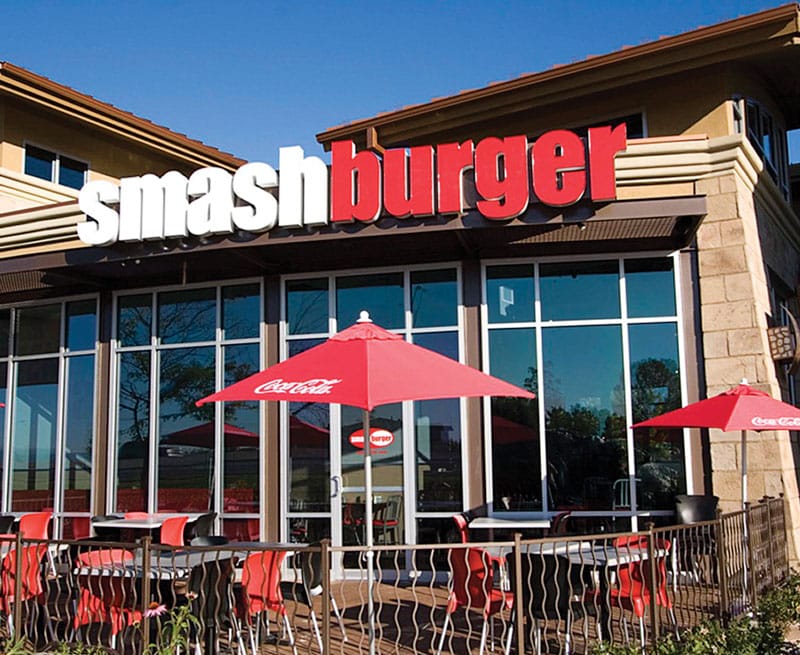 “We offer a progressive approach to partnering with our franchisees, treating them as co-investors and co-developers,” Prokupek says.
“We offer a progressive approach to partnering with our franchisees, treating them as co-investors and co-developers,” Prokupek says.
An Outside View: Jameson says “unique and signature differentiation” separates Smashburger from the crowded fast-casual burger category.
“With their Smash Fries, chicken sandwiches, salads, and three buns, Smashburger provides options that consumers seem to crave,” he says, adding that the company’s philosophy of treating franchisees as partners “drives a business model that can yield solid performance.”
Total U.S. Unit Count: 24,722 / all franchised
Franchise Fee: $15,000
Total Start-up Costs: $84,800–$258,300
Royalty: 8% of gross sales
Renewal Fee: None
Marketing Fee: 4.5% of gross sales
Powered by flexible unit formats, a health halo around its made-to-order products, and value-driven marketing that produces results, the world’s largest restaurant chain makes its third consecutive appearance on this list.
“Subway is known for its healthier alternatives to traditionally fatty fast foods, offers low start-up costs, and requires minimal experience, equipment, and space,” Subway spokesman Les Winograd says when defining the brand’s most deal-worthy traits.
Though concerns linger about cannibalization in the 100 percent franchised system, Subway’s robust results (system-wide sales in 2011 topped $16 billion) are difficult to discount and continue pushing entrepreneurs into the Connecticut-based sandwich giant’s franchising ranks.
An Outside View: Jameson says Subway franchisees benefit from a strong value equation, reasonable start-up costs, versatile store models, and strong area developers that manage and support new and existing franchisees.
“More on-the-ground support helps in a huge system, especially if you are bringing new franchisees in without any restaurant experience,” Jameson says. Still, he cautions franchisees to be clear about development agreements, territory, and defined market area.


